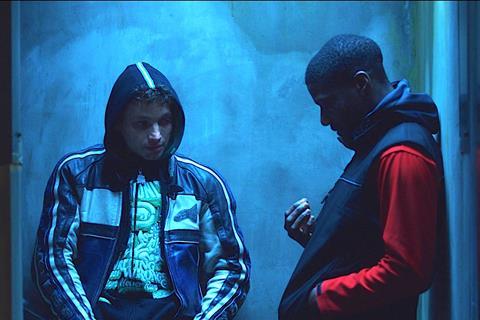Three French teens juggle edgy real-life with gaming fantasy in this disappointing thriller from the ‘Jessica Forever’ team

Dirs. Jonathan Vinel, Caroline Poggi. France. 2024. 106mins
There are about three movies in Eat The Night, the overstretched queer gangland romantic thriller by directors Jonathan Vinel and Caroline Poggi, much admired for their edgy sci-fi fantasy Jessica Forever (2018), which played at Tiff and Berlin. And none of them are particularly good. Pablo (Théo Cholbi) and his younger sister Apolline (Lila Gueneau) are held closely together by their shared love of ‘Darknoon’, an online game which mirrors Worlds of Warcraft. That bond is upset when ‘Darknoon’ announces its servers will go dark near Christmas, ending the game. As the days count down, Pablo, a drug dealer, angers a rival street gang and falls for a Black man named Night (Erwan Kepoa Falé).
Overstretched queer gangland romantic thriller
Eat The Night frustratingly switches tones, underwrites many of its characters and adds more threads than it can possibly tie together. Considering its virtual component—the film cuts into the digital world of its characters — one might think it’s premiering in Directors’ Fortnight with the aim of attracting queer viewers who may feel more free as avatars than in real life. Yet Vinel and Poggi inelegantly blend the gaming components with real-world travails, while also relying on predictable plotting.
It’s a script that attempts to move quickly and, in doing so, leaves much behind. In the span of a few minutes we understand that Pablo and Apolline have been estranged from their father for some time. Pablo is a loving, quick-trigger type who, through his illicit drug sales – which appear to be pretty small-time—is somehow supporting the siblings. Little else is shown of Apolline apart from the deep love for her brother and ’Darknoon’.
The filmmakers attempt to use the game as a window into Appoline’s emotions, and mostly she hops online to express her anger or depression. But that one-note, overly simplistic storytelling technique can’t make her feel like a real person. We don’t know if she’s made other friends in the game, or if she likes doing any other activities. That could be by design. After all, she is wholly dedicated to the escapism of a digital world. But the film isn’t necessarily interested in exploring that tension either. What exactly is she going to do once it all goes dark?
A similar thinness affects Night, too. He saves Pablo from a rival dealer’s goons, after he gets caught selling in their territory. Pablo soon talks Night into quitting his service job and moving out to a country shack, where they begin manufacturing their own drugs to sell on the street. Night dutifully follows Pablo; the pair get into club fights which mark both men out as targets for a gang with its own unnecessary backstory. We learn frustratingly little about Night, apart from him having a sister and a niece. Instead he is totally defined by his sexual presence: his attraction to Pablo, Pablo’s infatuation with him, and even Apolline’s growing affection. Night is an updated trope of the hyper-sexualized exotic Black body. Yes, he’s given slightly more interiorit, but he’s a trope nonetheless. You can see his fate from a mile away.
Eat The Night frantically switches between Apolline stubbornly sitting home alone and sensual scenes between Pablo and Night. The pair spend their days at their country shack having sex, playing soccer, having sex, dancing, having sex, talking, having sex, holding each other, and having sex, sex, sex. At least this film isn’t afraid to take pleasure in capturing the sexual appetite of the body. These are some of its strongest scenes, conjuring a steaminess under a proto-electronic score that thrums with energy.
It’s a shame, then, that the worlds outside of the shack, both real and virtual, lack any tangible qualities. Part of that stems from the sprawling storytelling. Every time we begin to get immersed in the dangers lurking behind the lurid colors of Pablo and Night’s underworld life, we’re quickly ripped out to spend time with Apolline inside of the game. The hard oscillations zap tension from the ensuing turf war, which devolves into sappy melodrama rather than hard-edged grit.
The gaming universe is similarly inert: the filmmakers take the perplexing option of making Pablo, Apolline, and eventually Night’s avatars look too similar to their real life appearances, taking away any visual sense of role-playing. The point is perhaps that they feel most like themselves here, hence the avatars progressively resembling their real-life visages as the film wears on — but the effect is an uncanny valley that distances more than engendering any emotion.
Production companies: Production Workshop, Agat Films Ex Nihilo
International sales: mk2 Films intlsales@mk2.com
Producers: Mathieu Verhaeghe, Thomas Verhaeghe, Juliette Schrameck, Olivier Père
Screenplay: Caroline Poggi, Jonathan Vinel & Guillaume Bréaud
Cinematography: Raphaël Vandenbussche
Production design: Margaux Remaury
Editing: Vincent Tricon
Music: ssaliva
Main cast: Théo Cholbi, Erwan Kepoa Falé, Lila Gueneau






















